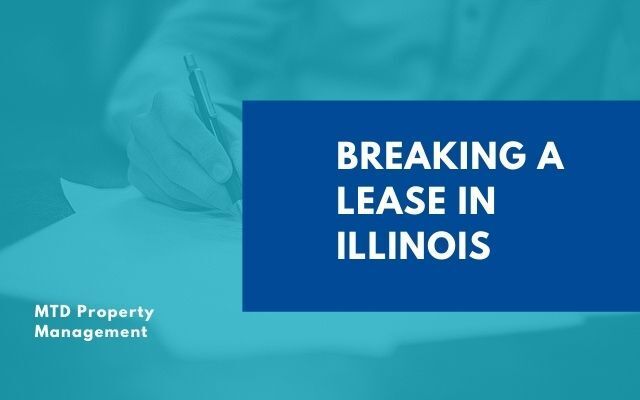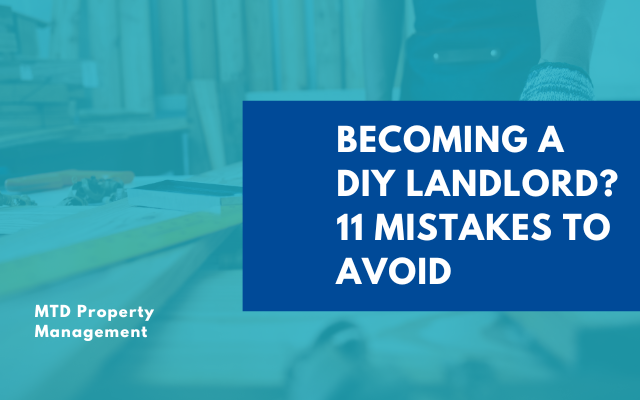Breaking A Lease in Illinois
As a Chicago, Illinois landlord, are you wondering how to go about breaking a rental lease or terminating a lease in this Illinois city?
A rental lease is a written agreement between a landlord and your Illinois tenants who rent your rental property or unit. Under normal circumstances, neither party can end the tenancy or break a lease unless the other party consents to it.
However, in Illinois, if a tenant breaks the lease for legally justified reasons, they may not be held liable for the remaining rent. In all other cases, Illinois landlords can hold Illinois tenants financially responsible for any losses incurred.
Now, breaking a lease for an existing or new lease in Illinois can be legally justified or not. When it's legally justified, your Illinois tenants may be able to break their rental lease early in Illinois without further responsibility except by providing an early lease termination notice. This requires the landlord to find new tenants to rent the apartment or rental unit earlier than expected.
Examples of situations in which tenants may be able to legally break a lease early in Illinois include if they're active service members or victims of domestic or sexual violence. In those cases, even for a month-to-month lease agreement, a landlord may require the tenant to provide proper notice indicating the end of their tenancy and any unpaid obligations.
Plus, Illinois tenants might need to ensure payment for any damages or repairs before moving out after giving the notice.
However, when Illinois tenants do not have a legally justified reason to terminate the lease agreement, landlords can hold them financially liable for any losses incurred. More specifically, as landlords, you can require them to pay the total remaining rent, regardless of whether they continue living on the rental or not.
Landlords may issue a formal notice to the tenant, informing them of their financial obligations under the lease in Illinois. Illinois tenants must provide written notice if they intend to vacate early, as outlined in the early termination clause.
Failure to adhere to early lease termination procedures may result in further penalties or legal action, including the obligation to terminate other associated agreements.
Examples of legally unjustified reasons when an existing or new tenant breaks a lease in Illinois include:
- Moving to be closer to family
- Moving in with a partner or after they break a relationship
- Upgrading or downsizing
- Relocating to a new job or school
- Moving to the home they purchased
According to Illinois law, these reasons for a tenant to break a lease provide no legal protection against penalties for failing to honor leases. The importance of adhering to lease terms and the state landlord-tenant law is why many Chicago landlords enlist the help of an experienced property management company to handle lease agreements and send out notice to tenants on on their behalf.
Let's take a more in-depth look at a tenant and landlord's responsibility when lease agreements can be broken:
Renters Rights & Responsibilities when Signing a Lease Agreement in Illinois
A lease agreement typically binds both parties for a period of one year. Until the lease ends, the contract gives both the landlord and their tenants certain rights and responsibilities.
Your Illinois tenant has a right, for instance, to live in their rented apartment for the entire life of the lease agreement, assuming they abide by the lease agreement. Abiding by leases means that a tenant must pay rent on time and provide notice of maintenance issues on the premises.
On your part as the landlord, you have a right to evict the tenant for violating the lease agreement. A landlord can evict a tenant for reasons such as:
- Failing to make each month's rent payments, or repeatedly paying rent late.
- Repeatedly throwing large, noisy events that disrupt other tenants or neighbors.
- Causing excessive damage to the rental.
- Failing to move after the lease expires which can result in an eviction case in court.
With that being said, it is a landlord's duty to ensure their eviction process adheres to Illinois landlord tenant law.
Even if tenants aren't paying rent, it’s likely illegal for a landlord to evict a problem tenant through
“self-help” eviction tactics. Such tactics include when you terminate utilities such as heat or electricity, remove the front door, or remove the tenant’s belongings after their lease expires.
The eviction process must begin with serving the tenant with a proper written notice. The landlord written notice must be relevant to the violation committed. If a landlord is evicting a tenant for unpaid rent, for instance, as the landlord, you must serve the tenant with a 5-Days’ Notice to Pay Rent or Leave which will force the tenant to either pay the rent owed or break their tenancy and vacate the rental unit.
When Breaking a Lease Early in Illinois is Legally Justified
Normally, once a tenant signs a lease, according to Illinois law, they become contractually bound to pay rent for the entire lease term, regardless of whether they wish to break the lease. A landlord can enforce this agreement and hold the tenant liable for unpaid rent, including potentially withholding the security deposit to cover losses.
However, there is an exception to this blanket rule. If the reason for breaking the lease is legally justified, the tenant will have no further obligation under the lease. In such cases, a landlord must make reasonable efforts to re-rent the rental property and cannot engage in landlord harassment to force the tenant to stay or pay unfair charges.
Additionally, Illinois law provides justifiable reasons for renters to terminate a lease early, and landlords must adhere to the law by returning the security deposit if applicable."
1. Your tenant is starting active military duty.
Tenants entering active military service have a right to break their lease under federal law. The Servicemembers Civil Relief Act (SCRA) protects members who have been deployed or received permanent change of station orders.
The law only protects members of the “uniformed services.” They include:
- Activated National Guard
- Commissioned corps of the Public Health Service
- Commissioned corps of the national Oceanic and Atmospheric Administration
- Armed forces
To break a lease, a landlord may require the tenant to do the following:
One: show proof that the lease agreement was signed prior to joining active service.
Two: show proof that they are going to be on duty for the next ninety days.
And three: provide you a copy of the deployment letters in addition to notifying you of their intent to move out.
2. The written lease contains an early termination clause.
Does your lease have an early termination clause? If so, a tenant can use it to break the lease early.
Normally, a landlord who allows a tenant to terminate a lease early usually requires them to pay a small penalty fee when they break the lease. The lease termination fee helps take care of some re-renting costs. For example, the cost of advertising the vacant rental unit and screening a new tenant for the lease.
The early termination fee is usually equivalent to the rent of two months. A landlord may also require existing renters to provide them with sufficient notice prior to ending the lease term so there is time to find a new tenant, as well.
3. The unit is not habitable.
Every state in the U.S. sets minimum standards for health and safety codes for every rental lease, and Illinois isn’t an exception.
As a landlord, you have a responsibility to maintain your rental property.
It must at all times meet state and local ordinances regarding health, safety, and building codes. If a landlord fails to meet these standards, a tenant may have several options to consider under their lease agreement.
Your tenant may have the option to make the repairs and deduct the costs from the rent. The Residential Tenants’ Right to Repair Act defines the circumstances that must be met for a tenant to exercise that right under their lease.
If a landlord neglects their responsibilities, the tenant can also choose to move out due to the landlord's failure to maintain the rental property, but they may need to provide proper notice before doing so. Likewise, landlords should issue written notice if they fail to address issues promptly, and tenants may provide additional notice to document unresolved concerns.
4. The Landlord has Harassed Them or Violated Their Right to Privacy.
When a landlord violates or harasses tenants, it may be enough justification for a tenant to terminate the lease. Examples of actions that may amount to landlord harassment include:
- Deliberate destruction of tenant’s unit.
- Refusing to accept a rent payment.
- Exaggerating notices of improper conduct.
- Withholding amenities that were previously allowed.
- Failing to make reasonable efforts to perform maintenance tasks and mitigate damages to the rental property in a timely and responsible manner and the landlord repeatedly violates the law in this way.
Every tenant in the state of Illinois also has a right to privacy. The state, however, doesn’t have a statute on when a landlord must notify the tenant of their entering the rented premises. That said, to protect yourself against claims of landlord harassment, provide renters with some form of notice.
5. The tenant is a victim of domestic or sexual violence.
Domestic violence victims also have a right under Illinois law (765 Ill. Comp. Stat. §750/15) to break their lease early. Besides domestic, the same applies to victims of sexual abuse and sexual assault.
Summary: How to Break a Lease in Illinois
As a landlord, we hope this guide gives you a general understanding of how to break a lease in Illinois. You also understand the legal process and the responsibilities of both the landlord and tenant.
If you have any further questions about breaking a lease in Illinois, security deposit laws, Illinois landlord tenant law or need help managing or need to re rent your unit, MTD Property Management can assist you! We have more than 30 years of experience in the Chicago real estate market.
Disclaimer: This blog on how to break your lease isn’t a substitute for professional legal advice from a qualified attorney. Laws change frequently, and this post might not be up-to-date at the time you read it. For help or edits, kindly get in touch with us.













